- Home
- Priscilla Royal
Justice for the Damned Page 2
Justice for the Damned Read online
Page 2
As he now mourned his own bitter loss in utter silence and with no hope of comfort, Thomas was beginning to understand what this unnamed woman might have suffered. “Must it ever be so?” he whispered as he seated himself, cross-legged on the ground. Pounding his fist into the forgiving earth, he pressed the back of his head into the rough bark of a tree and shut his aching eyes.
***
He had not wanted to come to Amesbury Priory and had fought against doing so, but his black-clad spy master refused to yield or compromise.
“I cannot go to Amesbury!” Thomas had cried out, still gasping from the other news the man had brought.
If the priest had had lips, he might have smiled. “A change of scenery will do you good,” he said, sipping wine from a beautiful goblet that had once been used by a less than saintly Tyndal monk whose current residence was probably Hell.
Despite that small, gold cross attached to a silken cord around the man’s neck, Thomas wondered if the priest was one of Satan’s own. Surely he needed something larger to remind him that he was supposed to serve a Lord who exemplified compassion.
“First you tell me that my father is dead, and then you send me off to hunt manuscript thieves. Will you not leave me alone so I might grieve a while?”
The man in black shrugged. “Why such grief? Although your father might have been most generous to you, a bantling seeded in a serving wench, your choice of bedmate surely killed his little fondness. You are a sodomite, a sin much akin to murder in the opinion of some. Surely I need not remind you of that? I am kind to set a task for you, my son. Sorrow without distraction becomes an indulgence that festers into sin.” He let his words sink in as he swirled the wine in his goblet, then sniffed at it. “Your prioress has an exceptional wine merchant.”
“And what sick brother am I to visit this time?” Thomas spat. “If you continue to send me on these errands, even the Devil himself will find it hard to devise enough plagues to afflict my mythical family. Or,” he lashed out, “shall I tell Prioress Eleanor that my father has died at Berkhamsted…” He pointed to a hypothetical location on the table. “…which is why I must go to Amesbury?” He banged his fist on another location far to the west of the first. “Do you know that her aunt is novice mistress in that priory?”
The man in black said nothing, continuing instead to study the color of his wine.
“Wouldn’t Sister Beatrice find it odd that a monk from Tyndal had arrived and was showing much interest in the Amesbury Psalter when Prioress Eleanor did not even know he was there? Might I suggest that one of your other underlings be the wiser choice to catch the thief who wants this precious item? How do you even know…?”
“We received warning.” The man in black savored the last of his wine, then stared into the empty goblet with evident regret. When at last he looked up, he blinked, and his expression slowly developed into mild surprise. “Did I not tell you? Your prioress will be traveling with you,” he said. “It is all arranged.”
***
The raucous cawing of a large crow dragged Thomas out of his miserable reflections, and he glanced up to see the cause of such avian rage. What he witnessed brought him to his feet in horror.
Lying flat on the severely pitched roof of the priory library and scriptorium, a man clung by his fingers to some invisible groove in the slate covering. The great black bird swooped at him, circled, and flew once more at the man’s head.
“Help!” Thomas shouted, but there was no one near to heed his cry. He ran to the wall, searching the ground with frantic haste for some fallen ladder.
Above him, he heard a scrabbling sound and next a voice: “Thank you, Brother! You scared the fiendish fowl away. I am safe enough and most grateful to you.”
Thomas looked up.
The young man, now standing with both feet firmly planted on the narrow scaffolding, was lean, muscular, and dressed only in his braes. Although his naked chest was still heaving from the exertion and his long brown hair was dark with sweat, the fellow was grinning.
Despite his pounding heart, Thomas returned the man’s infectious smile. “A miracle!” he shouted back.
“One peril of my occupation, Brother, but one to which I have become accustomed. King Henry may have given the priory ten cartloads of lead, but this roof has too steep a pitch for that and the slate was badly installed. Nails have rotted. Leaks occur. There are manuscripts within that could be damaged. I do my best to keep that from happening.” He put his hands on his hips and gestured with his head in the direction of a nearby tree. “The crow has a nest there. I had come too near her young. When she flew at me, I lost my footing.” He bent backward and fell. The scaffolding groaned, and the wooden walkway bent alarmingly.
Thomas cried out, instinctively raising his arms as if he might truly and safely catch a man falling from such a height.
The roofer jumped up, laughing like a boy caught in an innocent lark. “That slip was but a jest. The monks lead such dull lives. I do them some service with a harmless scare from time to time. Something must be done to keep their humors from growing too sluggish.”
“I fear that kindness was lost on me, friend, for I am not from Amesbury.”
“I did not think I had recognized you. I beg pardon, Brother…?”
“Thomas of Tyndal. And you?”
“Sayer.” As a gust of wind shook the scaffolding, the man kept his balance like a sailor on a ship. “Were you to slip over these walls for a bit of joy in the town, as some of the religious in this priory have been wont to do, you would hear me called anything from a fellow most fond of japes to an irresponsible and heartless knave. You may believe most of that but never that I am heartless.” He slowly tightened his braes around the waist. “And might you be a monk who finds he prays more diligently after refreshing his sense of sin?”
A feeling, akin to that of a virgin boy alone for the first time with a girl, inexplicably hit Thomas. A lump formed in his throat. He swallowed. “And if I am?” he asked as an idea forced the discomfort aside.
“I must warn you that the Saxon queen, who founded this priory as penance for her own misdeeds, has returned to torment the monks here. Some say that the wicked ways of the religious have angered her, and she roams the path from priory to village on many a night, bringing the fear of Hell to all she meets.” He shrugged. “Now the monks stay inside and pray for her earlier release to Heaven as they were paid to do.” Sayer’s grin destroyed any righteous meaning to his speech.
Either this Sayer was only repeating gossip or else he was telling him that he knew how to provide men, weary of hot dreams, with soft flesh for pleasuring. Might he also know something about men who lusted after precious manuscripts as well? “Yet she might not trouble strangers to the priory for these would not be beholden to her.” Thomas wondered what the man would say.
“You may be correct, Brother, for her quarrel should only be with those who promised to stay on their knees praying for the peace of her soul. If that is the case, a stranger could seek me out at the inn without fear of her wrath. I can be helpful—and discreet.”
“Especially if graced with a flash of the king’s face?”
“I love King Henry, Brother. He looks most noble on silver.”
“Such loyalty is no sin,” Thomas replied and smiled back in spite of himself. If Sayer provided whores for monks, he might well know others who worked outside the law. Thomas groaned in silence. Such a man would be useful if he could ever determine how to get outside the walls without provoking either suspicion or gossip that might get back to the ears of Prioress Eleanor. Coin would also be needed. Once again he cursed his spy master. The man was a fool to think a monk in the company of his prioress was suited to this sort of investigation.
“In the meantime, do not worry about me, Thomas of Tyndal. The fog might make this surface slippery, but God must love those who repair priory roofing. I have yet to fall to my death.” Sayer tossed his head, his hair falling
back to frame his beardless face.
Somewhere beyond the priory walls, a man shouted, his words lost in the breeze.
The sound made Thomas blink, and he realized he had been staring at Sayer. A handsome fellow, one that would have little trouble finding women to bed, he thought, then felt his face grow hot with embarrassment. He should not make such an assumption. After all, the roofer might well have a wife.
He quickly raised his hand to bless the man in farewell. As he walked away, his neck began to prickle as if someone was watching him. He spun around and looked up at the roof.
Sayer was carefully removing a piece of slate.
Chapter Three
Although the morning had promised warmth, the day remained quite chill. Accompanied by her aunt and Sister Anne, Eleanor retreated to the lodgings belonging to the prioress of Amesbury. There they found a lively fire. A servant quickly brought both wine and cheese for refreshment and just as promptly departed to allow the women private conversation.
As they all rubbed their hands near the fire, Eleanor looked around at her temporary residence, rooms she had rarely seen when she was a young novice and nun. When she had been brought to these chambers some days ago, Eleanor had commented with due courtesy on how comfortably appointed the quarters were. In this she had spoken the truth, for her own at the East Anglian priory were quite poor in comparison.
Three of the stone walls in this public room were softened with well-crafted and colorful hangings, whereas Eleanor had but one near her bed at Tyndal. Above the door here hung a smaller embroidered cloth which depicted Adam and Eve leaving Eden, a work that must have given Prioress Ida pause for thought each time she left the tranquility of her quarters for the chaos of the world without.
Against the other two walls, full-length tapestries kept any cold at bay. One illustrated the falling walls of Jericho, beside which stood a blond Joshua bearing a shield with three lions. Eleanor wondered if this had been a gift from King Henry or his queen in honor of their son, Edward, who was on crusade. The other showed a matronly Virgin holding the infant Jesus; the mother’s face vaguely resembled that of the prioress in charge during Eleanor’s youth.
Close to the fourth wall stood an altar and an elaborately carved prie-dieu, the wood of which glowed with a reddish cast in the firelight.
A comfortable enough room, Eleanor thought, yet she had discovered one lack. The Amesbury Psalter was missing, an elegant, illuminated work that had always been used by the prioress for her own prayers. Or so she remembered.
She turned to her aunt. “Does the priory still possess the Psalter done in Salisbury? You sometimes used it to teach us to read.”
“Rarely, child, rarely.” Beatrice shook her head. “Prioress Joan agreed that I might do so only as a reward for those most diligent in their work.” For a moment, she fell silent as if lost in a past memory, then she sipped her wine. “It would never have left this room, but one corner is torn. Prioress Ida sent it to the library and scriptorium where a monk more talented than any of our own will come to do the needed repair.”
“I must take you there to see it,” Eleanor said to Anne.
“An excellent walk for us both on a warmer day,” the sub-infirmarian replied as she rose and offered a plate of cheese to the other two women.
Eleanor shook her head in refusal and turned to Sister Beatrice. The novice mistress was examining the contents of her mazer, but her expression suggested that the quality of the wine was not her concern. Had the news brought to her by the man at the gate been so troubling? The prioress settled into her chair, grateful for the support of the firm wood. Her back ached.
“Did you learn something distressing from the laborer?” Eleanor asked.
“I did not expect to hear that Wulfstan, of all people, would see a ghost coming out of the reeds by the river.” Beatrice raised her hand in a gesture of disgust. “Had it been almost anyone else, I would have assumed that the vision was a wisp of fog that wound around a winter-killed bush or even a large bird. We have a crow nesting in a tree near the library. He may have seen it flying out of the fog near the river, but I am troubled indeed. Wulfstan is a steady fellow, not given to imaginings.”
“You said that he was not the first to see such a vision?”
With evident dismay, Beatrice shook her head. “All it takes is for one person to see something that frightens, something inexplicable, and rumors of ghosts multiply like mice.” She put down the wine and rested her chin against her folded hands. “Although I thought Wulfstan a more sensible man, he has apparently been infected with the same affliction shared by others who work on our lands. Even some of our own monks have run to us of late, claiming the priory itself is haunted.”
“When did this begin?” Eleanor asked.
Beatrice rubbed her hands together, reached again for her cup, and listened to the snapping flames before answering. “The sightings started some time before you arrived. At first, they were mere annoyances, but now they occur almost every night or early morning. Many say that some spirit from Hell has a quarrel with our priory. I fear that we must do something soon to dispel these ideas. The villagers are becoming fearful and our own monastics…” She smiled. “Ah, well! At least some of our monks have become more ardent in their prayers out of dread of this ghost. Perhaps I should bless the shade!”
“Has the spirit injured anyone?” Anne asked, politely ignoring the suggestion that any Amesbury monk might be less than devout.
“Some have suffered scrapes and bruises in their rush to run away.” Beatrice sipped her wine and set the cup down on the table.
“You said in the cloister that the creature had taken the shape of the priory’s founder?” Eleanor winced as her cramps returned.
“Most of the witnesses maintain that our ghost is that of Queen Elfrida, wife to King Edgar. Others, fewer in number but vocal enough, claim it resembles a local woman who drowned herself in the Avon and was buried in unsanctified ground. Mistress Eda was her name.”
“What cause has either spirit to trouble this priory?” Anne asked.
“According to legend, Sister, Amesbury was founded by Queen Elfrida in atonement for her part in the murder of her stepson, Edward the Martyr. For over two hundred years, our monastics have prayed that her soul might have ease in Purgatory and ascend quickly to Heaven, but some villagers believe we have become so sinful ourselves of late that her ghost has grown angry and returned to rebuke us.”
“Sinned? How?” Eleanor asked. “Are we not all sinners?”
“Our religious community has had some weak-fleshed members, although no more than many others. As a double house, and one run by women at that, we are especially prone to these rumors. Most in the village know us too well to accuse us of habitually wanton behavior, but I will not hide the truth here. The inn did attract some of our lay brothers and the occasional monk.”
“Surely Prioress Ida has dealt with this problem?” Eleanor replied.
“She learned from Brother Jerome about a break in the wall on the monks’ side of the grounds and promptly had it repaired before she left. I have since discussed the matter with our prior, and he believes that the repair has solved the problem. Where the mended wall might have failed to ensure chastity, the tales of this wandering spirit have succeeded. This, I have confirmed with a trustworthy source in the village itself. The inn has seen no tonsure for some time.”
“Thus the spirit of your founder should be satisfied and leave you in peace,” Anne said.
“Not yet, for Wulfstan claims he saw her last night.” The novice mistress’ tone conveyed her vexation.
“Might the thing be the wraith of the woman damned for self-murder?” Anne glanced briefly at her prioress, who was leaning forward, quite attentive to the conversation. “What quarrel had she with the priory?”
“Other than the burial, Mistress Eda had none. Before her death, she suffered from a growth in her womb. The disease resisted prayer and the
aid of mortal medicine, both of which we gave her. One day her husband found her missing, and her body was soon discovered floating in the Avon.”
“And who adjudged the death self-murder?” Eleanor asked, glancing at the food on the table.
Anne reached over and passed her some cheese.
“The crowner did, based on evidence given by several villagers.”
“Yet someone believes the decision was in error or else the rumor would not be rife that Mistress Eda is the ghost.” Eleanor smiled at Anne in thanks and took a piece.
“Her childhood friend, Mistress Jhone, is the source of that, and the widower agrees with her. Few others concur.” Beatrice watched her niece eat one bite of cheese and then another.
“Mistress Jhone and the bereaved husband think...?”
“…that Mistress Eda slipped, but was so weakened by her illness that she was unable to pull herself from the water.”
“Why did the crowner’s verdict find otherwise?” Anne said, casually placing the plate of food closer to her prioress’ elbow.
“Everyone here knew that Mistress Eda hated the river and would never have walked there willingly. When she was young, she had taken her younger brother down to the Avon but fell asleep in the sun. The boy decided to go swimming and drowned. She never forgave herself,” Beatrice replied. “After she grew ill, all knew her pain. When her body was found, they concluded that she had given up all hope and turned against God in her suffering. Satan, they said, must have seen his chance to gain her soul and lured her to the river in the guise of her brother.”
Eleanor now tore off a small bit of bread and nibbled at it thoughtfully.
“All these rumors and tales are nonsense.” Beatrice slammed her fist down on the table. “There is no ghost. No matter what is claimed, imagined, or believed, Saint Augustine taught us that there is no communication between the world of the living and that of the dead.”

 The Twice-Hanged Man
The Twice-Hanged Man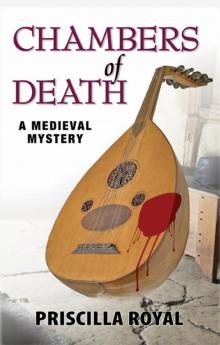 Chambers of Death mm-6
Chambers of Death mm-6 Forsaken Soul
Forsaken Soul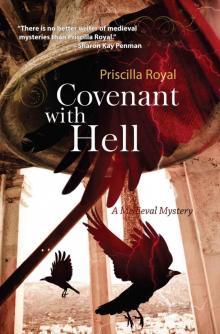 Covenant With Hell (Medieval Mysteries)
Covenant With Hell (Medieval Mysteries)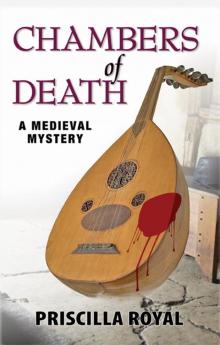 Chambers of Death
Chambers of Death Tyrant of the Mind
Tyrant of the Mind Wild Justice
Wild Justice Sorrow Without End
Sorrow Without End Wine of Violence
Wine of Violence Tyrant of the Mind mm-2
Tyrant of the Mind mm-2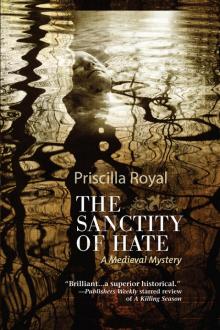 The Sanctity of Hate
The Sanctity of Hate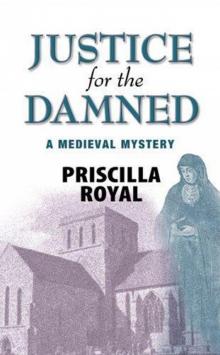 Justice for the Damned
Justice for the Damned The Proud Sinner
The Proud Sinner A Killing Season mm-8
A Killing Season mm-8 Forsaken Soul mm-5
Forsaken Soul mm-5 Valley of Dry Bones mm-7
Valley of Dry Bones mm-7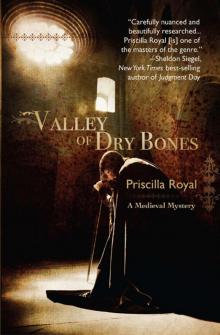 Valley of Dry Bones
Valley of Dry Bones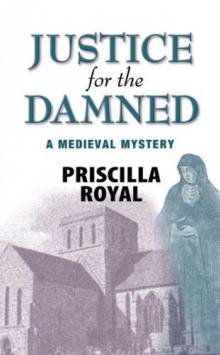 Justice for the Damned mm-4
Justice for the Damned mm-4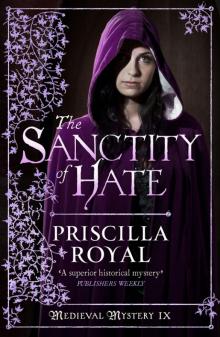 Sanctity of Hate
Sanctity of Hate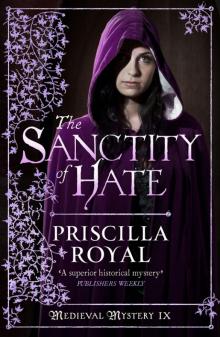 Sanctity of Hate mm-9
Sanctity of Hate mm-9 Wine of Violence mm-1
Wine of Violence mm-1